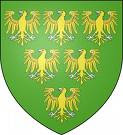The March issue of the BBC History magazine is consumed by the discovery of Richard III's skeleton and it's impact on history. Mark Ormrod has written an article in which he questions whether the same investigations might now be carried on other royal burials. The obvious one would be the urn in Westminster Abbey containing the bones of 'the little princes', but both the Queen and the Abbey say they have no reason to doubt they are the bones of the princes, and any examination would not answer any questions we might have. Ormrod actually suggests something which has crossed my mind - an investigation into the tomb of Edward II, to discover whether -
1. the body contained in it is Edward II
2. and if so, the age of the king when he died.
This obviously stems from the story that Edward II survived after 13 27, and the body in the tomb is either a substitute or in fact Edward interred at a later date. I obviously appreciate respect is needed for the opening/investigating of royal tombs, but the mystery of the possible survival of Edward II is as exciting to me as 'the princes in the Tower'. Ian Mortimer and Kathryn on her superb blog -
Death of Edward II - make a strong case that Edward did indeed survive, and one of the most compelling arguments for me is the fact that his son, Edward III, did not visit his father's tomb for many years, and it begs the question, why? Because he knew the tomb did not contain his father's body? and when he did visit, was it because his father had really died then and he was attending the actual funeral? makes sense to me.
1 week ago



5 comments:
Oooh, how exciting that would be! I'd so dearly love for these questions to be answered. Thanks for the link to my blog post, Anerje!
Anerje, it would be fantastic to learn whether Edward actually died in 1327. I do agree: the argument concerning Edward III's visits (or rather lack of them)to his father's tomb is much telling indeed.
P.S. You have to admit that Richard III may become useful after all :-) at least when it comes to further discoveries in British history :-):-) He (or his case) has already somehow "opened the way".
You're welcome Kathryn - you're my main source for info:>
Kasia - you're right, the discovery of Richard III's remains are indeed useful - the BBC mag cites a number of historians who think it's a bit of an 'own goal' for Ricardians - and that if Shakespeare was right about the 'crooked back', he may have been right about Richard's character, and his black reputation is not all Tudor propaganda.
Today there is news of the discovery of skeletons of a plague pit!
Oh, no! Have I just opened the Pandora box for Richard? :-)
Kasia, you just might have ;>
Post a Comment